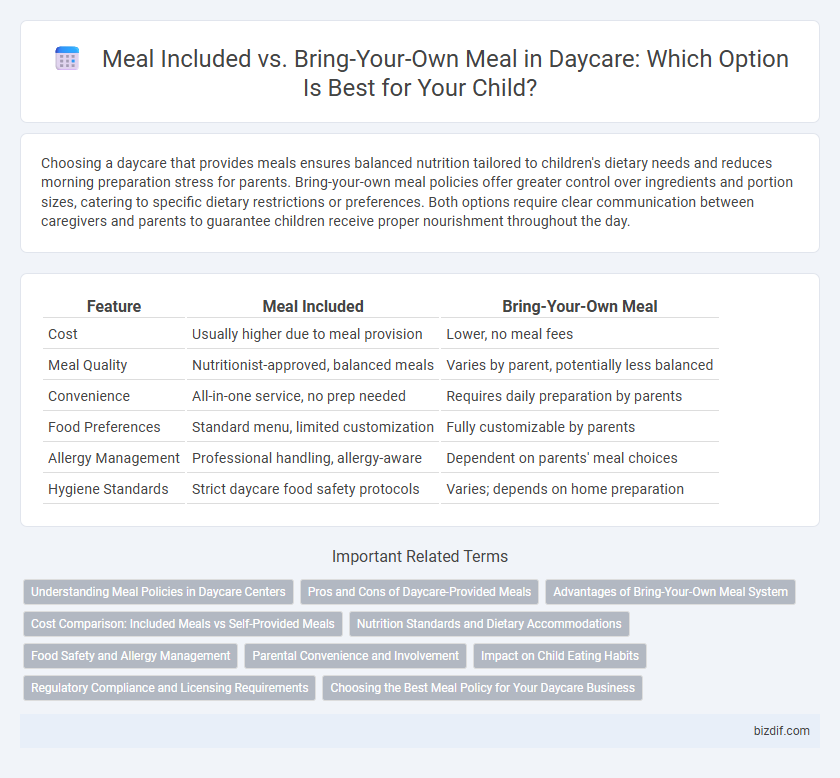Choosing a daycare that provides meals ensures balanced nutrition tailored to children's dietary needs and reduces morning preparation stress for parents. Bring-your-own meal policies offer greater control over ingredients and portion sizes, catering to specific dietary restrictions or preferences. Both options require clear communication between caregivers and parents to guarantee children receive proper nourishment throughout the day.
Table of Comparison
| Feature | Meal Included | Bring-Your-Own Meal |
|---|---|---|
| Cost | Usually higher due to meal provision | Lower, no meal fees |
| Meal Quality | Nutritionist-approved, balanced meals | Varies by parent, potentially less balanced |
| Convenience | All-in-one service, no prep needed | Requires daily preparation by parents |
| Food Preferences | Standard menu, limited customization | Fully customizable by parents |
| Allergy Management | Professional handling, allergy-aware | Dependent on parents' meal choices |
| Hygiene Standards | Strict daycare food safety protocols | Varies; depends on home preparation |
Understanding Meal Policies in Daycare Centers
Daycare centers typically offer meal options that either include provided meals or require parents to bring their own, each with distinct nutritional standards and allergy protocols. Understanding meal policies involves reviewing the center's guidelines on food preparation, ingredient disclosure, and accommodation for special dietary needs to ensure child safety and health compliance. Clear communication between parents and caregivers about meal preferences and restrictions is essential to support balanced nutrition and prevent potential food-related issues.
Pros and Cons of Daycare-Provided Meals
Daycare-provided meals ensure nutritional balance and food safety by adhering to established dietary guidelines and sanitation standards, reducing the risk of allergens and contaminants. These meals offer convenience for parents, eliminating the need to prepare and pack food daily, but may limit customization for individual dietary preferences or restrictions. Cost can be higher compared to bring-your-own meals, and children may have less exposure to diverse homemade foods that reflect family traditions.
Advantages of Bring-Your-Own Meal System
Bring-your-own meal systems in daycare settings ensure children receive customized nutrition tailored to their specific dietary needs and allergies, reducing health risks. Parents maintain full control over meal ingredients, portion sizes, and mealtime routines, promoting consistency between home and daycare. This approach also encourages early development of healthy eating habits and cultural food preferences, supporting overall child well-being and family values.
Cost Comparison: Included Meals vs Self-Provided Meals
Daycare centers that offer included meals typically charge higher tuition fees, reflecting the cost of balanced nutrition and meal preparation services. Families opting for bring-your-own meals can save on these additional fees but may need to invest in meal planning and suitable containers to meet childcare nutrition standards. Evaluating the total expense requires comparing the convenience and quality assurance of included meals against the potential savings and effort involved in self-provisioned food.
Nutrition Standards and Dietary Accommodations
Daycares that provide meals typically follow strict nutrition standards set by health authorities to ensure balanced diets rich in essential vitamins, minerals, and appropriate portion sizes for children's growth. Meal-included programs are often better equipped to accommodate dietary restrictions such as allergies, gluten-free, or vegetarian diets, as they have access to regulated ingredient sourcing and professional meal planning. Bring-your-own meal options may lack standardized nutritional quality and pose challenges in managing cross-contamination or meeting individualized dietary needs consistently.
Food Safety and Allergy Management
Daycare centers offering meal included programs ensure strict food safety protocols by preparing meals in regulated kitchens with allergen controls to prevent cross-contamination. In bring-your-own meal policies, the responsibility of allergy management and food safety primarily lies with parents, increasing the risk of exposure to allergens if meals are not adequately vetted. Implementing clear guidelines and communication between staff and families is essential to maintain a safe eating environment for children with food allergies.
Parental Convenience and Involvement
Meal included daycare programs enhance parental convenience by eliminating the need to prepare and pack food daily, ensuring balanced nutrition tailored to young children's dietary requirements. Bring-your-own meal options foster greater parental involvement, allowing customization according to specific dietary preferences or restrictions and the opportunity to introduce familiar foods. Parents must weigh the ease of centralized meal provision against the personalized control and engagement offered by bringing meals from home.
Impact on Child Eating Habits
Providing meals at daycare fosters consistent nutrition, exposing children to balanced and varied foods that support healthy eating habits and reduce picky eating. In contrast, bring-your-own meal policies can lead to inconsistent dietary quality and reinforce selective eating patterns based on caregivers' choices. Ready access to nutritious meals in daycare settings encourages social eating and food exploration, positively influencing lifelong dietary preferences.
Regulatory Compliance and Licensing Requirements
Daycare centers must adhere to strict regulatory compliance and licensing requirements regarding meals, often mandating meal provisions that meet specific nutritional standards to ensure child safety and health. Centers offering meal-included services are required to follow state and federal guidelines, such as the Child and Adult Care Food Program (CACFP), to provide balanced, allergen-aware meals. In contrast, bring-your-own meal policies require daycares to implement procedures for safe food storage, labeling, and allergy management, aligning with health department regulations to prevent contamination and ensure proper nutrition.
Choosing the Best Meal Policy for Your Daycare Business
Selecting an optimal meal policy for your daycare business requires evaluating nutritional standards, allergen management, and parental preferences. Offering meals included allows for controlled portion sizes and consistent quality, while a bring-your-own meal approach accommodates diverse dietary needs and reduces liability. Balancing these factors ensures compliance with childcare regulations and enhances overall child satisfaction and well-being.
Meal Included vs Bring-your-own Meal Infographic

 bizdif.com
bizdif.com